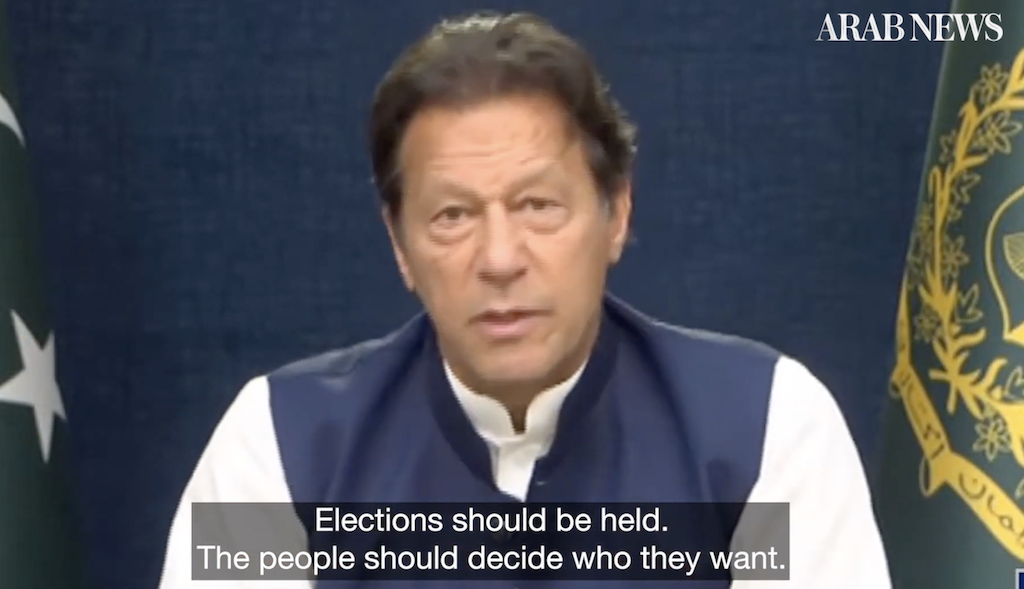ISLAMABAD: Prime Minister Imran Khan on Sunday “congratulated” the nation after the deputy speaker of the national assembly disallowed voting on a no-confidence motion against the premier on grounds it was “unconstitutional,” with the president subsequently dissolving the national assembly.
Khan has said the campaign to oust him through a no-trust vote was part of a foreign conspiracy orchestrated by the United States.
As Sunday’s session began, Information Minister Chaudhry Fawad Hussain said in light of the alleged foreign interference in domestic politics, the no-trust motion was against Article 5, which deals with obedience and loyalty to the state and constitution. Deputy Speaker Qasim Suri accepted Hussain’s points as “valid,” and threw out the motion on the grounds it was “unconstitutional.”
“We will not let such a (foreign) conspiracy succeed,” Khan said in an address to the nation after the parliament session. “I have just now sent my advice to the president of Pakistan to dissolve the assemblies.”
Khan then called on the public to prepare for elections: “No foreign government or corrupt people will decide (the fate of the nation).”
The president subsequently dissolved the national assembly, with Khan’s close aide Hussain saying the prime minister will continue his duties as premier.
The Supreme Court has taken notice of the development, with local media reporting that top judges had arrived at the apex court’s building to begin deliberations.
“There are no ifs and buts, the speaker’s ruling is blatantly unconstitutional,” said Reema Omer, a legal adviser for the South Asia region at the International Commission of Jurists.
“Imran Khan has no authority to advise the president to dissolve the National Assembly. Dissolving the assembly on the advice of a person who has no authority to do so has no constitutional basis.”
On Saturday, the prime minister had suggested in remarks to reporters he might not accept the vote to oust him, saying the process had been “discredited” and the move was a “blatant interference in domestic politics by the US.” In speeches earlier, Khan has also spoken about a purported letter that proved a foreign conspiracy to topple his government. Washington has denied the allegations.
“How can I accept the result when the entire process (of the no-confidence vote) is discredited?” Khan told a select group of foreign journalists at his office on Saturday. “Democracy functions on moral authority — what moral authority is left after this connivance?”
Ahead of Sunday’s session, up to 100 members of the opposition filed a no-confidence request against National Assembly Speaker Asad Qaiser.
In Qaiser’s absence, Suri led the proceedings, saying the no-confidence motion had to be according to the law and constitution.
“No foreign power shall be allowed to topple an elected government through a conspiracy,” he said before he rejected the no-confidence motion for being unconstitutional.
Opposition parties have called the speaker’s ruling illegal and said they will move the Supreme Court against it.
“Pakistan’s constitution has been subverted,” opposition leader Bilawal Bhutto-Zardari said after the session. “We will do a sit-in at the National Assembly until the vote is allowed to take place.”
He added: “The Supreme Court has to decide that the vote must take place today.”
The joint opposition filed the no-trust motion against Khan earlier this month, accusing him of orchestrating an economic meltdown, foreign policy failures and poor governance.
Under the Pakistani constitution, a prime minister is elected by a majority of the lower house, the National Assembly. A candidate needs a simple majority of legislators, 172, to vote for them to become prime minister. That is the same number of votes needed in a no-confidence vote to oust them and dissolve their cabinet.
The opposition collectively had 162 members, while the government had the support of 179 lawmakers, including its coalition partners.
In recent weeks, however, defections by over a dozen of his party’s lawmakers and the exit of coalition partners have left Khan short of a simple majority.




